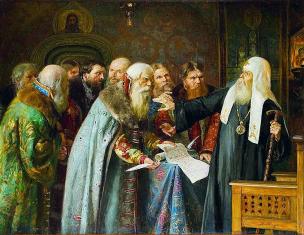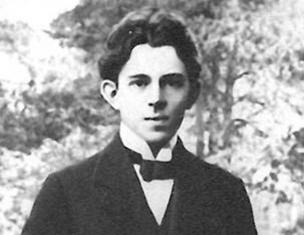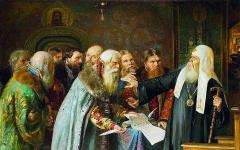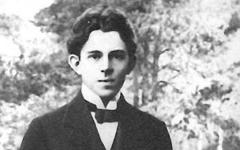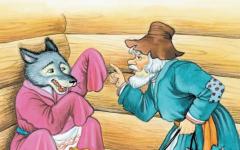Ivan Andreevich Krylov filled the fable “The Wolf in the Kennel” with deep content and patriotic overtones. It is dedicated to the events of 1812. Which famous historical figures became its heroes? – you will find out after reading the instructive poem.
Fable "The Wolf in the Kennel"
The wolf at night, thinking of getting into the sheepfold,
I ended up at the kennel.
Suddenly the whole kennel yard rose up -
Smelling gray so close to the bully,
The dogs are flooded in the barns and are eager to fight;
The hounds shout: “Wow, guys, thief!”
And instantly the gates are locked;
In a minute the kennel became hell.
They run: another with a club,
Another with a gun.
“Fire!” they shout, “fire!” They came with fire.
My Wolf sits with his backside pressed into the corner.
Teeth snapping and fur bristling,
With his eyes, it seems he would like to eat everyone;
But, seeing what is not here in front of the herd
And what finally comes
He has to pay for the sheep, -
My cunning man set off
In negotiations
And he started like this: “Friends! Why all this noise?
I, your old matchmaker and godfather,
I came to make peace with you, not at all for the sake of a quarrel;
Let's forget the past, let's establish a common harmony!
And not only will I not touch the local herds in the future,
But I’m happy to fight for them with others
And I affirm with a wolf’s oath,
What am I..." - "Listen, neighbor, -
Here the hunter interrupted in response, -
You are gray, and I, my friend, am gray,
And I have long known your wolfish nature;
Therefore, my custom is:
There is no other way to make peace with wolves,
Like skinning them off.”
And then he released a pack of hounds at the Wolf.
Moral of Krylov's fable “The Wolf in the Kennel”
The moral of the fable “The Wolf in the Kennel” is contained in the final words of the hunter and is that enemies must be defeated and destroyed, without succumbing to any of their persuasion about a truce, because these persuasion can only be a consequence of a hopeless situation and, if circumstances were different, the enemy will not spare.
Analysis of the fable “Wolf in the kennel”
As noted earlier, the fable “The Wolf in the Kennel” is dedicated to the events of 1812, when, having captured Moscow and being “driven into a corner” because of this, the French Emperor Napoleon tried to conclude a peace treaty with M.I. Kutuzov, but he failed , since the great commander could not forgive the Frenchman for the losses that the Russian army suffered because of him.
Napoleon in this fable is the Wolf, and the hunter is Kutuzov.
However, the analysis of this work cannot be limited only to the historical fact described above. Its meaning is much broader: everyone can get involved in a war, but not everyone is able to stand with honor to the end, and since blood has been shed, no matter what the insidious and resourceful enemy says, you need to fight him, since if the circumstances were the opposite, he would definitely not spared
Winged expressions from the fable “The Wolf in the Kennel”
- “I have known your wolfish nature for a long time” - is used in the fable “The Wolf in the Kennel” as a mockery in the meaning: “I cannot be deceived, I know you too well for that.”
- “You are gray, and I, my friend, am gray” - a phrase that characterizes the speaker’s wisdom in relation to the addressee and literally reads: no matter how hard I try, I still see right through your nature.
The wolf at night, thinking of getting into the sheepfold,
I ended up at the kennel.
Suddenly the whole kennel yard rose up -
Smelling gray so close to the bully,
The dogs are flooded in the barns and are eager to fight;
The hounds shout: “Wow, guys, thief!”
And instantly the gates are locked;
In a minute the kennel became hell.
They run: another with a club,
Another with a gun.
“Fire!” they shout, “fire!” They came with fire.
My Wolf sits with his backside pressed into the corner.
Teeth snapping and fur bristling,
With his eyes, it seems he would like to eat everyone;
But, seeing what is not here in front of the herd
And what finally comes
He has to pay for the sheep, -
My cunning man set off
In negotiations
And he started like this: “Friends! Why all this noise?
I, your old matchmaker and godfather,
I came to make peace with you, not at all for the sake of a quarrel;
Let's forget the past, let's establish a common harmony!
And not only will I not touch the local herds in the future,
But I’m happy to fight for them with others
And I affirm with a wolf’s oath,
What am I..." - "Listen, neighbor, -
Here the hunter interrupted in response, -
You are gray, and I, my friend, am gray,
And I have long known your wolfish nature;
Therefore, my custom is:
There is no other way to make peace with wolves,
Like skinning them off.”
And then he released a pack of hounds at the Wolf.
Analysis/moral of the fable “The Wolf in the Kennel” by Krylov
One of the most famous historical fables by Ivan Andreevich Krylov is “The Wolf in the Kennel.” This is an allegory from the time of the Napoleonic War.
The fable was created in the fall of 1812. Its author is just over forty; under the patronage of A. Olenin, he received a place in the capital’s Public Library. During this period, he creates stories only on original, national material. The meter is typical for most of his fables - free iambic with paired rhyme, the origins of which should be sought in Russian raesh verse. Once again, the rapid development of events: the wolf, instead of the sheepfold (where the sheep were slumbering, respectively), ended up in the kennel (where not only hunting dogs settled, but also the hunter-hunters themselves). “Loaded up”: of course, barking. “Ahti”: an interjection conveying the commotion that has arisen. The triple mention of fire in one line serves the same purpose. Comparison: became hell. People quickly slam the Wolf into a trap. The enumerative gradation “with a club, with a gun” does not bode well for the gray one. “My Wolf”: there is a sense of mockery in the pronoun. Idiom: eat with your eyes. “To pay off the sheep”: to pay for all the atrocities that he got away with (from his paws) for too long. He flatters and becomes a godfather and matchmaker to the hounds and their dogs, and makes a solemn “wolf oath.” However, they know that the godfather is incorrigible. He is not even allowed to finish his sentence. “Do not make peace”: do not agree to a peace agreement. The hounds are unleashed on the gray friend.
The work is a response to the turning point of the Patriotic War of 1812: Napoleon tried to negotiate peace with the Russians. However, his proposal was rejected, and soon the French emperor suffered a severe defeat at Tarutino, inflicted by the army led by M. Kutuzov. In November of the same year, after the battle near Krasnoye, Field Marshal M. Kutuzov personally read this fable to his officers. At the words “I am gray,” he bared his head and, as an eyewitness wrote, “shaked his bowed head.” It should be said that the fable came into the hands of the commander personally from the author, who passed it on to M. Kutuzov’s wife. And the latter sent her husband a text by letter. It is known that I. Krylov’s fables were famous in the military environment of that time. The conflict is built on the contrast of a pair of characters: the hunter and the Wolf. The first is M. Kutuzov, the second is Napoleon, driven into a corner. The conversation with the treacherous is short. Moreover, with an enemy encroaching on his native land. Moreover, they found themselves in a hopeless situation. There is no obvious morality, although it is obvious. The fable, meanwhile, still lives on its own, even outside the historical context, so colorful are its characters and recognizable characters. Paraphrase: gray bully. Inversion: the court rose (a metaphor for the people's resistance to the enemy), the cunning man set off. “Interrupted”: modern “interrupted.” Example of familiar parentesis: friend, neighbor.
The fable “The Wolf in the Kennel” was first published in the magazine “Son of the Fatherland,” Part I, No. 2, in October 1812. The original plot of this fable is based on one of the key episodes of the Patriotic War of 1812.
The action of the fable takes place in a kennel, where the Wolf mistakenly ended up, intending to kidnap a sheep from the sheepfold. The dogs instantly sensed the predator and made a noise. The hounds came running at this noise and closed the gate, cutting off the wolf's path to retreat.
Seeing that there was no way to get out of the trap, the Wolf tried to negotiate with the dogs, reminding them that he was a distant relative of them. The wolf swore that he would never steal sheep again and even protect them from other predators. In response to the Wolf’s speeches, the Hunter said that he knew the wolf’s nature well and was not going to go to peace. After this, the Hunter unleashed a pack of hounds on the Wolf.
By the Wolf in the kennel, Krylov in his fable means Napoleon in Russia. Napoleon had already entered Moscow by that time and, thinking that he had won the war, waited for the Russian emperor to respond to his proposal for peace. But Emperor Alexander I promised not to end the war until the enemy left Russia.
Napoleon waited in vain for the Russians to agree to his terms. As a result, he found himself in a trap. The general plan of military action, communicated to Kutuzov from St. Petersburg at the beginning of September, was to act in Napoleon's rear, making retreat difficult. Prince Volkonsky, sent to receive an explanation from Kutuzov for his actions, reported to the emperor that it would be difficult for Napoleon to get out of Russia.
Like Napoleon, the Wolf in the kennel in Krylov’s fable also found himself in a hopeless situation. The flattering words of the Wolf quite accurately correspond to Napoleon’s then proposals for concluding peace.
By dogs, Krylov in the fable means troops and people’s militia who were eager to fight. Seeing the Wolf, the hounds closed the gate to the kennel, and he found himself in a trap. In the image of the Hunter, Krylov presented Kutuzov, who “locked” Napoleon in Moscow, as if in a trap. According to contemporaries, Kutuzov read the fable after the battle of Krasnoye to the officers gathered around. When reading the lines: “and I, friend, am gray,” the commander took off his cap and shook his bowed gray head. The reading of the fable was accompanied by friendly laughter. The next day the whole camp read the fable. Thus, Krylov’s creativity raised the morale of the Russian army.
“You are gray, and I, my friend, am gray” - this phrase shows that Krylov valued cunning in his Hunter primarily, and perhaps even exclusively. This fabulist’s view of the commander-in-chief is fully justified by many historical data. Before Kutuzov left for the army, one of his relatives had the indiscretion to ask: “Do you, uncle, really hope to defeat Napoleon?” Kutuzov answered: “No. But I hope to deceive.” He said almost the same thing during the Tarutino camp: “Napoleon can defeat me, but not deceive me.” Kutuzov did not succumb to Napoleon’s cunning speeches and, as a result, the invader left Moscow, and later left the borders of Russia with the remnants of his army.
From the fable “The Wolf in the Kennel” it is clear how keenly Krylov followed the events of the Patriotic War and how accurately he noticed everything that happened. In the fable, Krylov expressed a feeling of national resentment and a just thirst for revenge. All of Russia spoke through the poet’s mouth at that time. Subsequently, under the influence of the fable “The Wolf in the Kennel,” the proverb “The wolf in the kennel has its tail between its legs,” which was included in Dahl’s collection, was born.
|
WOLF AT THE kennel Wolf, at night, thinking of getting into the sheepfold, “You are gray, and I, buddy, are gray, |
Notes
VIII
WOLF AT THE kennel
First published in “Son of the Fatherland”, 1812, Part I, No. 2, pp. 79-80 (qualification, section, dated October 7, 1812). Autographs: PB 11, PB 5. Written in early October in connection with the receipt of news in St. Petersburg about Napoleon’s attempt to enter into peace negotiations through Lauriston, who had a meeting with Kutuzov on September 23, 1812. Lauriston conveyed to Kutuzov Napoleon’s peace proposals, given in Kutuzov’s report to Alexander I. They indicated that Napoleon “wants to put a limit to the disagreements between the two great peoples and put a stop to it forever” (see M. Bogdanovich, “History of the Patriotic War,” vol. II , page 392). Kutuzov decisively rejected Napoleon's proposals and on October 6 defeated the French troops at Tarutino.
According to a contemporary, “Krylov, having rewritten the fable with his own hand, gave it to Kutuzov’s wife, who sent it in her letter. Kutuzov read the fable after the battle of Krasny to the officers gathered around him, and at the words: “And I’m a gray-haired friend,” he took off his white cap and shook his bowed head” (Mikhailovsky-Danilevsky. Complete collection, op., vol. V. p. 243 ). About the success that Krylov’s patriotic fables had
in the army, evidenced by a letter from K. Batyushkov to N. Gnedich dated October 30, 1813: “Tell Krylov,” wrote Batyushkov, “that... in the army everyone reads his fables by heart. I often heard them in bivouacs with new pleasure.” (K. Batyushkov. Works, St. Petersburg, 1887, p. 480).
We place here the entire original version of the fable based on the autograph PB11:
The wolf at night, thinking of getting into the sheepfold,
I ended up at the kennel.
There<был доступ>not clever
Yes only<как-то выйдет>over there?
There was barking and howling, and the kennel yard became hell.
The hounds are running: one with a club,
Another with a gun.
“Fire, fire!” - they shout. They came with fire.
My Wolf is sitting with his back pressed against the corner.
And he finally sees
It came to him to pay for the sheep.
However, the cunning man thinks,
Let me try to negotiate.
And he began: “Friends, this noise is in vain:
I am your old matchmaker and godfather,
I came to make peace with you; not at all for the sake of a quarrel.
[Let's establish harmony between ourselves again
And not only will I not touch the local herds in the future,
But I’m happy to fight for them all!
Are you satisfied? - "Wonderful! »
Then the hunter answered: “Listen, my light,
You are gray, I am gray!
So you can’t deceive me -
And believe me, you are working in vain.”]
Handwritten options (PB 5):
Printed versions (CO):
To verses 5, 20 and 24 in the special notice “Son of the Fatherland”, amendments were given that coincide with the final text of subsequent editions (“Son of the Fatherland”, 1812, part I, p. 1/6).
The wolf wanted to eat the sheep, but instead of the sheepfold he accidentally climbed into the kennel. The dogs, sensing the wolf spirit, made a noise and barked. The hounds brought fire to see what was causing such a commotion. The wolf, realizing that in front of him were not sheep, but dogs, and that now the end would come to him, decided to cheat. He said that he had come to make peace, that he would never steal sheep again, and would even protect them from other wolves. But the huntsman did not believe the Wolf and unleashed the dogs on him.
Read the fable Wolf in the kennel online
The wolf at night, thinking of getting into the sheepfold,
I ended up at the kennel.
Suddenly the whole kennel yard rose up -
Smelling gray so close to the bully,
The dogs are flooded in the barns and are eager to fight;
The hounds shout: “Wow, guys, thief!”
And instantly the gates are locked;
In a minute the kennel became hell.
They run: another with a club,
Another with a gun.
“Fire!” they shout, “fire!” They came with fire.
My Wolf sits with his backside pressed into the corner.
Teeth snapping and fur bristling,
With his eyes, it seems he would like to eat everyone;
But, seeing what is not here in front of the herd
And what finally comes
He has to pay for the sheep, -
My cunning man set off
In negotiations
And he started like this: “Friends! Why all this noise?
I, your old matchmaker and godfather,
I came to make peace with you, not at all for the sake of a quarrel;
Let's forget the past, let's establish a common harmony!
And not only will I not touch the local herds in the future,
But I’m happy to fight for them with others
And I affirm with a wolf’s oath,
What am I..." - "Listen, neighbor, -
Here the hunter interrupted in response, -
You are gray, and I, my friend, am gray,
And I have long known your wolfish nature;
Therefore, my custom is:
There is no other way to make peace with wolves,
Like skinning them off.”
And then he released a pack of hounds at the Wolf.

(Illustration by Irina Petelina)
Moral of the story: Wolf in the kennel
The wolf wanted to save his own skin with the help of hypocrisy. But the smart and experienced Hunter knew the habits of wolves, that they could not be trusted, so that they would not say: “You are gray, and I, my friend, are gray.” The fight against any insidious enemy is difficult, but necessary.


